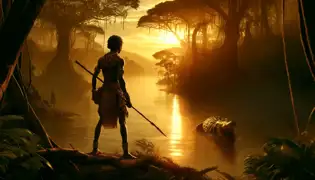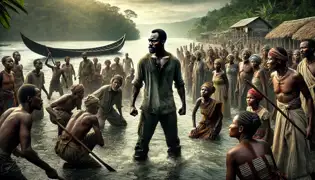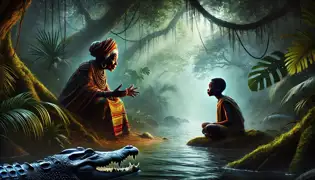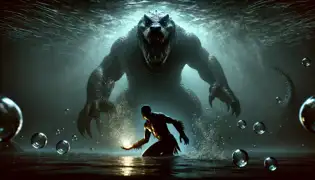Kibamba and the Crocodile King
Reading time: 7 min

About this story: Kibamba and the Crocodile King is a Legend from Congo set in the Ancient. This Poetic tale explores themes of Courage and is suitable for All Ages. It offers Moral insights. A young warrior challenges a legendary beast to free his people from fear.
Long ago, in the depths of the Congo, where the river slithered through dense jungles and the trees whispered secrets of old, there was a village called Malonga. It was a place of laughter and life, where children splashed in the shallows, and fishermen cast their nets under the golden embrace of the sun. The river was their lifeline, their source of food and prosperity—but it was also their greatest fear.
For beneath its shimmering surface lurked something terrible.
M'Bula.
The Crocodile King.
A beast unlike any other, M'Bula was as old as the river itself. His scales were like stone, his eyes burned with an eerie intelligence, and his jaws could crush a canoe in a single snap. He ruled the waters with an iron grip, demanding offerings from the villagers in exchange for their safety. And if the tribute was not enough, he would take what he pleased—livestock, boats, even people.
The people of Malonga had lived under M'Bula’s shadow for generations. They whispered his name in fear, careful never to speak it too loudly, lest they invite his wrath.
But one man refused to live in fear.
His name was Kibamba.
And this is his story.
Shadows Over Malonga
The morning air was thick with the scent of damp earth and river mist as Kibamba stood at the edge of the water, his hands steady as he helped his father mend a fishing net. His father, old and weathered by the years, worked in silence, his fingers weaving deftly through the torn fibers.
"You dream too much, my son," his father said without looking up. "You dream of things that cannot be."
Kibamba frowned. "And what if they can?"
His father sighed. "M'Bula is no ordinary crocodile. Many have tried to fight him. None have returned."
"That doesn't mean he can't be defeated," Kibamba said, tightening the knots in the net. "It just means they didn’t know how."
His father shook his head but said nothing more.
Then, a terrible cry split the morning air.
A woman came running toward the river, her face twisted with grief. Others followed, their voices rising in alarm. Kibamba stood quickly, his heart pounding.
"Mosi!" the woman wailed. "Mosi is gone!"
Kibamba's blood ran cold. Mosi was a fisherman, a friend, a man with a laugh that could shake the trees. He had gone out on the water before sunrise. Now, his canoe drifted aimlessly along the riverbank—empty.
"M'Bula," someone whispered.
The crowd parted as the village elder, N’Dabi, stepped forward. He was an old man, his face lined with the weight of too many lost souls. He gazed at the river, his expression unreadable.
"It has been too long since the last tribute," he murmured.
Kibamba clenched his fists. "So we just accept this? We let him take whoever he wants?"
"What choice do we have?" N’Dabi said softly. "The river belongs to M'Bula."
"No," Kibamba said, his voice firm. "The river belongs to us."
And in that moment, he knew what he had to do.
He would find the Crocodile King.
And he would end him.

The Road to the River’s Heart
That night, Kibamba stood before the elders in the great meeting hut.
“I will go after M'Bula,” he declared.
Murmurs filled the room. Some looked at him with pity, others with admiration. But N’Dabi only stared into the fire, his wrinkled hands clasped before him.
Finally, he spoke. “Many have made this vow before you, Kibamba. None have returned.”
“I am not them.”
The old man studied him for a long moment, then nodded slowly. He turned to a wooden chest and withdrew something small—a carved idol of a crocodile, its eyes painted red.
“This was given to me by my father, and to him by his father before him. It is said that the river spirits speak through it. Perhaps it will guide you.”
Kibamba took the idol, its surface smooth and warm in his palm.
“Thank you,” he said.
Before dawn, he left his village behind, walking along the riverbank, deeper into the jungle than he had ever dared before. The trees thickened, their roots twisting like the fingers of sleeping giants. Strange eyes watched him from the undergrowth. The air grew heavy, thick with the scent of damp moss and hidden things.
For three days, he walked. He crossed rivers on fallen logs, climbed cliffs where vines clung like desperate hands, and slept beneath the stars, his spear always close.
On the fourth day, he came upon a woman sitting by the river. She was old—older than anyone Kibamba had ever seen, her skin wrinkled like dry earth, her hair white as foam. But her eyes… her eyes were sharp, knowing.
“You seek the Crocodile King,” she said before Kibamba could speak.
He hesitated, then nodded.
She chuckled. “Brave, foolish boy. You cannot kill him with mere strength. M'Bula’s heart is not where you think.”
Kibamba frowned. “Where is it?”
She pointed to the river. “At the bottom of the sacred lake, where the water never stills.”
He stared at the churning water, a sense of unease crawling up his spine.
“Be warned,” the old woman said. “M'Bula is more than just a beast. He is ancient. He is cunning. And he knows you are coming.”

The Crocodile King Rises
The sacred lake was unlike any water Kibamba had ever seen. It did not ripple gently like the river—it boiled, swirled, churned, as if something within it was alive.
And then, the surface broke.
M'Bula rose from the depths, his massive form cutting through the water like a nightmare. He was enormous, his body armored in thick, dark scales, his eyes burning like molten gold.
“You dare come here, little man?” His voice was deep, ancient, rolling like distant thunder. “You seek to challenge a king?”
Kibamba gripped his spear. “I seek to end your rule.”
M'Bula laughed, a terrible, rumbling sound. “Fool. No spear can pierce my hide.”
But Kibamba had not come to fight the beast. He had come for his heart.
He dived into the lake.
The water closed around him, murky and cold. He swam deeper, his lungs burning, his hands searching blindly. And then—there! A faint glow, resting on the lakebed.
M'Bula’s heart.
As his fingers closed around it, the water trembled. A terrible roar filled his ears. Above him, M'Bula thrashed, his power unraveling.
With every ounce of strength, Kibamba crushed the heart in his hands.

The lake shuddered. The sky darkened. M'Bula let out a final, agonized scream before sinking beneath the waves.
The Crocodile King was no more.
The Return of the Hero
Kibamba emerged from the lake, gasping, shaking. The jungle was silent, holding its breath.
Then, life returned—the birds sang, the trees whispered, the river flowed free.
When he returned to Malonga, the people gathered in awe.
“M'Bula is gone,” he declared.
The village erupted into cheers. Drums thundered. Firelight danced in the night. Kibamba had done what no one before him had dared—he had faced the Crocodile King and won.
And his name would be remembered forever.
Epilogue
Years passed, and Kibamba became a leader among his people. The river flourished, free at last. But though M'Bula was gone, Kibamba always carried the small crocodile idol—a reminder that courage, not strength, was the greatest weapon of all.
And so, the legend lived on.
















